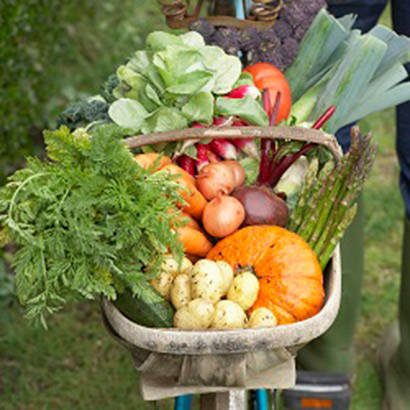
The National Trail Parks and Recreation District (NTPRD) maintains parks, trails, and outdoor recreational facilities in Clark County, Ohio, which includes Springfield. NTPRD seeks to promote health and wellness among the residents of Clark County by offering a variety of physical fitness and healthy living programs. The children’s gardening program was a natural outgrowth of NTPRD’s mission.
For several years, NTPRD had an herb garden located next to the District’s administration building in Springfield that was used for educational programs in the summer day-camp. That garden expanded into a vegetable garden when four raised beds were built. The gardens are used in after-school programs and summer day-camps, the latter operated by NTPRD. The after-school programs are located in schools in Clark County and have a physical activity and nutrition focus. Groups of third through fifth graders are bussed to the garden where they are taught gardening skills and nutrition. This year’s summer day-camps brought about 40 children aged 7 to 14 into the garden, who participated in gardening activities run jointly by camp and NTPRD staff. In contrast to the more racially and socio-economically diverse after-school children, the day-campers are predominantly lower income and African-American from Springfield’s inner city. Between the day-camps and after-school programs, the garden is in use from spring through fall.
The main goals of the program, according to Penny Dunbar, NTPRD Recreation Specialist, are to increase the children’s knowledge of gardening and nutrition and awareness of where food comes from. Ms. Dunbar noted that, “you would be surprised at how kids don’t know where their food comes from!” She has also observed that children who work in the garden often feel a sense of accomplishment that can lead to increased self-esteem and fewer behavior problems. Ms. Dunbar stated, “I think [the children] show … a sense of ownership and responsibility for the plants that they have helped to plant and taken care of ….”
Involving more adults and families from nearby neighborhoods in gardening is a longer term goal, not only for improved nutrition and health, but because some of those neighborhoods have a dearth of food stores, limiting access to fresh foods.
The NRPA grant was used to build the raised beds and for gardening supplies. The program’s primary partnership is with county and city schools. In addition, Ohio State University Extension Service provides nutrition education for the after-school program in which both children and their parents participate. Ms. Dunbar believes that long-term sustainability will come from maintaining the program’s current partnerships, building new partnerships, and receiving additional grants.
